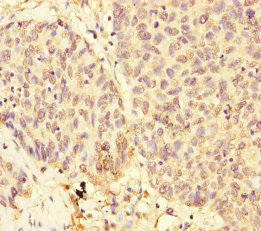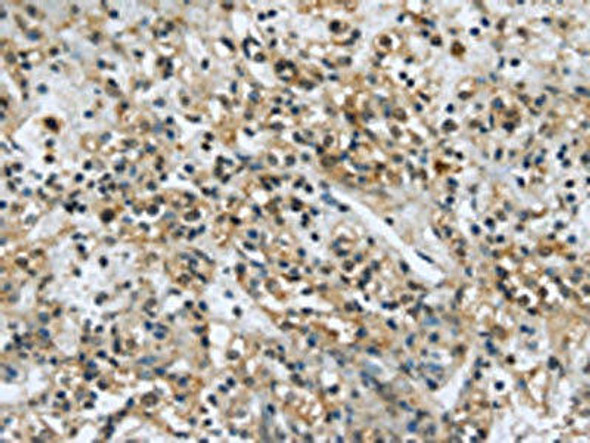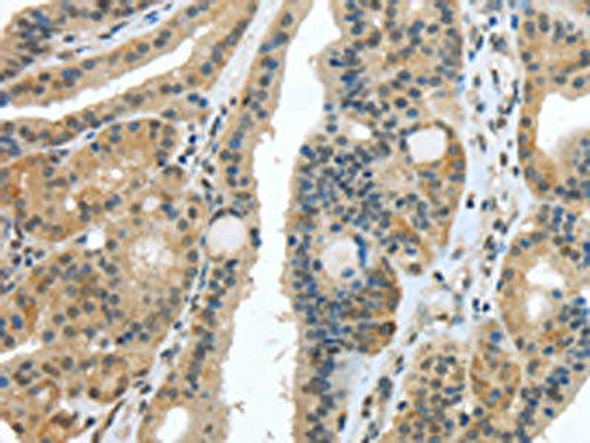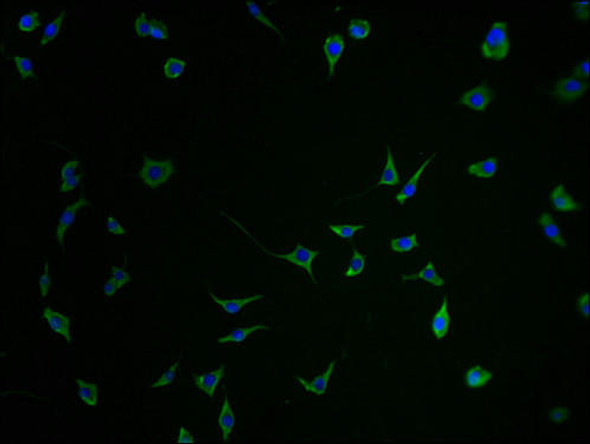USP28 Antibody (PACO45632)
- SKU:
- PACO45632
- Product Type:
- Antibody
- Reactivity:
- Human
- Host Species:
- Rabbit
- Isotype:
- IgG
- Applications:
- ELISA
- IHC
- Antibody Type:
- Polyclonal Antibody
- Conjugation:
- Unconjugated
Description
USP28 Antibody (PACO45632)
The USP28 Antibody (PACO45632) is a highly specific and sensitive tool for research involving USP28, a key protein involved in the regulation of cell cycle progression and DNA damage response. This monoclonal antibody, produced using advanced technology, is suitable for various experimental techniques, including immunofluorescence, immunohistochemistry, and flow cytometry.USP28, a deubiquitinase enzyme, is known for its role in stabilizing key proteins involved in cell cycle regulation, such as p53 and MDM2. Dysregulation of USP28 has been linked to cancer development and progression, highlighting its potential as a therapeutic target in oncology research.
By using the USP28 Antibody, researchers can investigate the expression and localization of USP28 in cellular processes, shedding light on its function and potential implications in disease pathology.This high-quality antibody offers researchers a reliable tool for studying USP28 biology in various experimental settings, providing valuable insights into its molecular mechanisms and potential therapeutic applications.
| Antibody Name: | USP28 Antibody (PACO45632) |
| Antibody SKU: | PACO45632 |
| Size: | 50ul |
| Host Species: | Rabbit |
| Tested Applications: | ELISA, IHC |
| Recommended Dilutions: | ELISA:1:2000-1:10000, IHC:1:20-1:200 |
| Species Reactivity: | Human |
| Immunogen: | Recombinant Human Ubiquitin carboxyl-terminal hydrolase 28 protein (430-580AA) |
| Form: | Liquid |
| Storage Buffer: | PBS with 0.02% sodium azide, 50% glycerol, pH7.3. |
| Purification Method: | Antigen Affinity Purified |
| Clonality: | Polyclonal |
| Isotype: | IgG |
| Conjugate: | Non-conjugated |
 | Immunohistochemistry of paraffin-embedded human ovarian cancer using PACO45632 at dilution of 1:100. |
| Background: | Deubiquitinase involved in DNA damage response checkpoint and MYC proto-oncogene stability. Involved in DNA damage induced apoptosis by specifically deubiquitinating proteins of the DNA damage pathway such as CLSPN. Also involved in G2 DNA damage checkpoint, by deubiquitinating CLSPN, and preventing its degradation by the anaphase promoting complex/cyclosome (APC/C). In contrast, it does not deubiquitinate PLK1. Specifically deubiquitinates MYC in the nucleoplasm, leading to prevent MYC degradation by the proteasome: acts by specifically interacting with isoform 1 of FBXW7 (FBW7alpha) in the nucleoplasm and counteracting ubiquitination of MYC by the SCF(FBW7) complex. In contrast, it does not interact with isoform 4 of FBXW7 (FBW7gamma) in the nucleolus, allowing MYC degradation and explaining the selective MYC degradation in the nucleolus. Deubiquitinates ZNF304, hence preventing ZNF304 degradation by the proteasome and leading to the activated KRAS-mediated promoter hypermethylation and transcriptional silencing of tumor suppressor genes (TSGs) in a subset of colorectal cancers (CRC) cells. |
| Synonyms: | Ubiquitin carboxyl-terminal hydrolase 28 (EC 3.4.19.12) (Deubiquitinating enzyme 28) (Ubiquitin thioesterase 28) (Ubiquitin-specific-processing protease 28), USP28, KIAA1515 |
| UniProt Protein Function: | USP28: a peptidase of the C19 family. USP28 and FBXW7 regulate Myc protein stability in response to DNA damage. Two isoforms of the human protein are produced by alternative splicing. |
| UniProt Protein Details: | Protein type:EC 3.4.19.12; Protease; Ubiquitin-specific protease Chromosomal Location of Human Ortholog: 11q23.2 Cellular Component: nuclear body; nucleoplasm; protein complex Molecular Function:protein binding; ubiquitin-specific protease activity Biological Process: cell proliferation; DNA damage checkpoint; DNA damage response, signal transduction by p53 class mediator resulting in induction of apoptosis; protein deubiquitination; Ras protein signal transduction; regulation of protein stability; response to DNA damage stimulus; response to ionizing radiation |
| NCBI Summary: | The protein encoded by this gene is a deubiquitinase involved in the DNA damage pathway and DNA damage-induced apoptosis. Overexpression of this gene is seen in several cancers. [provided by RefSeq, Oct 2016] |
| UniProt Code: | Q96RU2 |
| NCBI GenInfo Identifier: | 20140700 |
| NCBI Gene ID: | 57646 |
| NCBI Accession: | Q96RU2.1 |
| UniProt Secondary Accession: | Q96RU2,Q6NZX9, Q9P213, B0YJC0, B0YJC1, |
| UniProt Related Accession: | Q96RU2 |
| Molecular Weight: | 122kDa |
| NCBI Full Name: | Ubiquitin carboxyl-terminal hydrolase 28 |
| NCBI Synonym Full Names: | ubiquitin specific peptidase 28 |
| NCBI Official Symbol: | USP28 |
| NCBI Protein Information: | ubiquitin carboxyl-terminal hydrolase 28 |
| UniProt Protein Name: | Ubiquitin carboxyl-terminal hydrolase 28 |
| UniProt Synonym Protein Names: | Deubiquitinating enzyme 28; Ubiquitin thioesterase 28; Ubiquitin-specific-processing protease 28 |
| Protein Family: | Ubiquitin carboxyl-terminal hydrolase |
| UniProt Gene Name: | USP28 |











